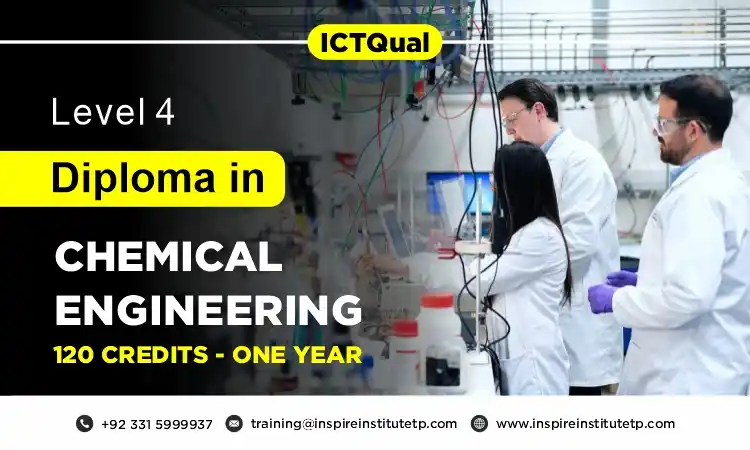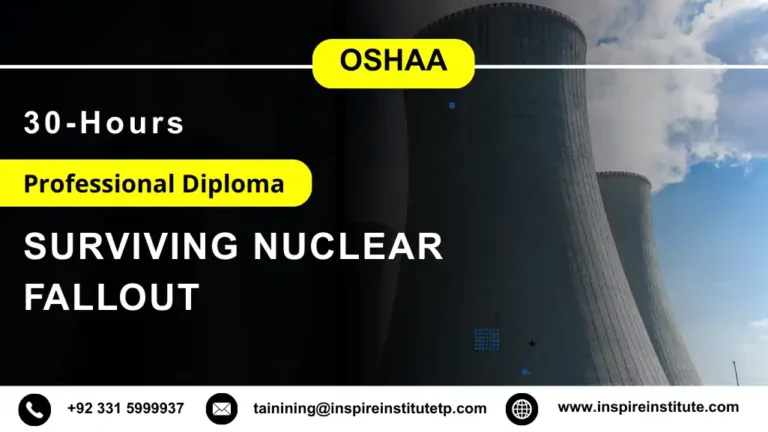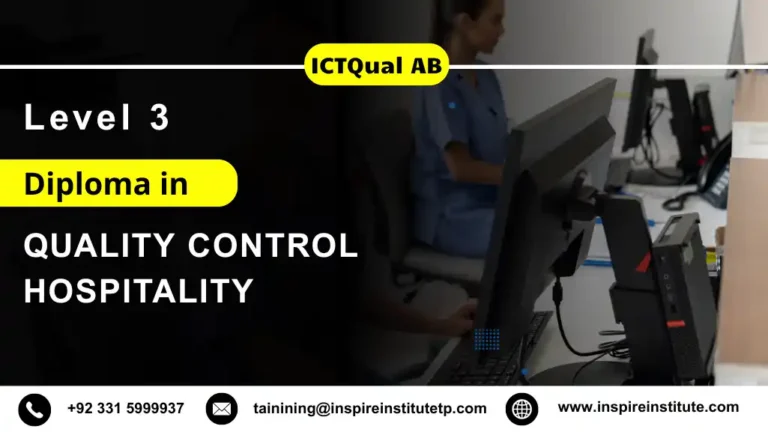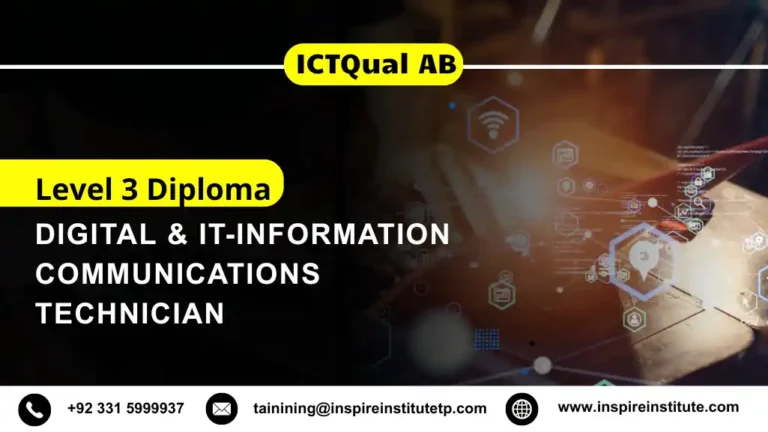ICTQual Level 4 Diploma in Chemical Engineering 120 Credits – One Year
The ICTQual Level 4 Diploma in Chemical Engineering is a one-year qualification designed to provide students with advanced knowledge and practical skills in chemical engineering. With 120 credits, this course covers key topics such as process design, thermodynamics, chemical reaction engineering, and materials science. Students will gain expertise in applying engineering principles to chemical processes, preparing them for careers in industries such as petrochemicals, pharmaceuticals, food production, and environmental engineering. This diploma is ideal for individuals seeking to specialize in chemical engineering and contribute to innovations in process engineering and industrial applications.
Why Choose this Qualification
Choosing the ICTQual Level 4 Diploma in Chemical Engineering offers a variety of significant benefits for those looking to specialize in this vital and dynamic field. Here’s why this qualification is an excellent choice:
- Industry-Relevant Knowledge: The diploma provides comprehensive coverage of essential chemical engineering concepts, including process design, chemical reaction engineering, thermodynamics, and materials science. This ensures students are equipped with the in-demand skills required by industries such as petrochemicals, pharmaceuticals, food production, and environmental engineering.
- Practical, Hands-On Learning: The course emphasizes practical learning through lab work, simulations, and real-world applications. Students gain valuable experience in chemical processes, reactor design, and problem-solving, making them ready to apply their knowledge in a professional setting.
- High Employability: Chemical engineering is a core field in numerous industries. Graduates of the ICTQual Level 4 Diploma are well-prepared for a range of roles, including process engineer, chemical plant operator, project manager, and safety officer. The qualification enhances your employability in both established and emerging sectors, including renewable energy and sustainable practices.
- Strong Career Progression: This qualification provides a solid foundation for further studies or career advancement. It can lead to higher-level positions in chemical engineering or related fields, and graduates may also pursue specialized certifications or advanced degrees to deepen their expertise.
- Versatile Skill Set: The course combines engineering principles with practical chemical knowledge, providing graduates with a versatile skill set that can be applied across a variety of industries. This unique combination opens up opportunities in areas like process optimization, environmental engineering, and product development.
- Global Opportunities: Chemical engineering skills are highly transferable globally. Completing this diploma can open doors to international career opportunities in countries with thriving chemical, petrochemical, and manufacturing industries, ensuring graduates can work in diverse environments.
- Future-Proof Qualification: The course covers modern and emerging areas of chemical engineering, such as sustainable practices and green technologies. Graduates are prepared to contribute to innovations in clean energy, waste management, and sustainable manufacturing, aligning with the industry’s growing emphasis on sustainability.
- Contribute to Global Challenges: Chemical engineering plays a crucial role in addressing global challenges, from developing cleaner energy sources to improving public health through pharmaceuticals. This qualification enables you to contribute to meaningful solutions in areas that have a significant impact on society.
Overall, the ICTQual Level 4 Diploma in Chemical Engineering is an excellent choice for those looking to pursue a rewarding career in chemical engineering, providing the essential skills, knowledge, and practical experience to succeed in this dynamic field.
Course Overview
Awarding Body:ICTQual AB
Course Level: Level 4
Average Completion Time:
1 year.
Credits Hours : 120
Evidence & Assignment Based
Qualification Structure
- Introduction to Chemical Engineering
- Process Heat Transfer
- Fundamentals of Chemistry for Engineers
- Fluid Mechanics for Chemical Engineers
- Mass Transfer Operations
- Chemical Reaction Engineering
- Materials and Process Selection
- Process Control and Instrumentation
- Environmental Engineering in Chemical Processes
- Chemical Engineering Thermodynamics
- Safety and Risk Management in Chemical Engineering
- Chemical Process Design Project
Who Should Take This Course
The ICTQual Level 4 Diploma in Chemical Engineering is ideal for individuals who are interested in pursuing a career in chemical engineering or looking to specialize in the field. Specifically, this course is suitable for:
- Aspiring Chemical Engineers: Individuals who wish to enter the chemical engineering field and gain the necessary technical skills and knowledge to work in industries such as petrochemicals, pharmaceuticals, food production, or energy.
- Science or Engineering Graduates: Those with a background in subjects such as chemistry, physics, biology, or general engineering who want to specialize in chemical engineering and gain a deeper understanding of process design, chemical reactions, and materials science.
- Professionals Looking to Upskill: Current professionals working in engineering, manufacturing, or related fields who wish to expand their skill set and pursue a specialized career in chemical engineering. This course can enhance their expertise and open up new career advancement opportunities.
- Technically-Inclined Individuals: People with a strong interest in applying scientific principles to real-world problems, such as designing efficient chemical processes, improving production techniques, or developing sustainable solutions.
- Environmental and Sustainability Advocates: Individuals who are passionate about sustainability and want to work in areas such as green technologies, waste management, and renewable energy. Chemical engineers are at the forefront of developing environmentally-friendly processes and solutions.
- Career Changers: People from other technical disciplines, such as mechanical, civil, or electrical engineering, who want to transition into the chemical engineering field. This course provides the foundational knowledge needed for such a career change.
- Technologists and Technicians: Those already working as technologists, technicians, or operators in industries like manufacturing, energy, or pharmaceuticals, and who wish to advance to more technical or managerial roles in chemical engineering.
- International Students: Those looking to build an international career in chemical engineering. This qualification provides skills that are in demand globally, allowing graduates to pursue opportunities in multinational companies or across different countries with thriving chemical engineering sectors.
This course is perfect for anyone who is motivated to develop their expertise in chemical engineering, whether they are just starting their career, looking to advance in their current role, or transitioning from another engineering discipline. The ICTQual Level 4 Diploma provides the technical foundation and practical experience needed to succeed in the competitive chemical engineering industry.
Course Benefits
The ICTQual Level 4 Diploma in Chemical Engineering offers several valuable benefits for students seeking to advance their careers in the chemical engineering field. Here are the key benefits of this course:
- Comprehensive Knowledge in Chemical Engineering: The diploma covers essential topics such as process design, chemical reaction engineering, thermodynamics, and materials science. Students will develop a deep understanding of the core principles that underpin chemical engineering, making them well-prepared for various roles in the industry.
- Practical, Hands-On Experience: The course places a strong emphasis on practical learning, giving students the opportunity to work on real-world engineering problems. Through laboratory work, simulations, and case studies, students gain the hands-on experience required to apply their knowledge in professional settings.
- Career Readiness: With a focus on both theoretical knowledge and practical skills, the diploma prepares graduates to step directly into a wide range of chemical engineering roles. Whether in petrochemicals, pharmaceuticals, food production, or environmental engineering, graduates will be equipped to meet the demands of the industry from day one.
- High Employability: Chemical engineering is a highly sought-after skill in various sectors. Completing this diploma significantly enhances employability, opening up opportunities for roles such as process engineer, chemical plant operator, safety engineer, and project manager. Graduates are well-positioned to pursue careers in both established industries and emerging fields like renewable energy.
- Career Advancement Opportunities: For those already working in the engineering or manufacturing sectors, this diploma offers a pathway to career progression. It provides the advanced knowledge and credentials needed for promotions, managerial roles, or the opportunity to specialize in areas like process optimization and environmental sustainability.
- Global Career Opportunities: Chemical engineering is a global profession with demand across industries in many countries. The skills acquired during the course are transferable internationally, offering graduates the chance to pursue career opportunities in diverse geographical regions.
- Foundation for Further Studies: This qualification provides a strong foundation for students who wish to pursue further education in chemical engineering or related fields. Graduates may choose to continue their studies with advanced diplomas, certifications, or degrees to further specialize in areas like bioprocessing, environmental engineering, or nanotechnology.
- Focus on Sustainability: The course includes a strong focus on sustainable practices in chemical engineering. Students will learn how to design and optimize processes that are environmentally friendly and energy-efficient, preparing them to contribute to global sustainability goals.
- Versatile Skill Set: The diploma combines technical, scientific, and engineering knowledge, equipping graduates with a versatile skill set that can be applied across various industries. This makes it an excellent qualification for those seeking diverse career opportunities in engineering, manufacturing, and technology.
- Recognition by Employers: The ICTQual Level 4 Diploma in Chemical Engineering is recognized by employers and industry professionals, ensuring that graduates have a qualification that is respected and valued in the chemical engineering sector.
In summary, the ICTQual Level 4 Diploma in Chemical Engineering provides students with the knowledge, practical experience, and credentials necessary for a successful career in the chemical engineering field. Whether you’re looking to start a new career, upskill, or advance in your current role, this course offers numerous benefits that will help you succeed in a rapidly evolving industry.
Eligibility Criteria
Eligibility Criteria for the ICTQual Level 4 Diploma in Chemical Engineering (120 Credits – One Year):
Minimum Qualification: Applicants must have a Level 3 qualification, such as A-Levels, BTEC National Diploma, NVQ Level 3, or an equivalent qualification. A background in chemistry, physics, mathematics, or engineering is highly recommended, as the course involves technical concepts in chemical processes, thermodynamics, material science, and engineering principles.
Age Requirement: Candidates must be at least 18 years of age to enroll in the course, ensuring they are mature enough to handle the academic and practical demands.
English Proficiency: Proficiency in English is essential, as the program involves technical terminology, written reports, and effective communication within the chemical engineering field.
Basic Computer Skills: Applicants should have basic computer skills, as the course requires the use of engineering software for assignments, project management, design, analysis, and simulations.
Optional Experience: While not mandatory, prior exposure to chemical engineering, chemistry, or related technical fields can provide a solid foundation. This could include knowledge of chemical reactions, industrial processes, or laboratory practices, which can enhance the learning experience.
By meeting these entry requirements, applicants will be well-prepared to succeed in the ICTQual Level 4 Diploma in Chemical Engineering and excel in the chemical engineering industry.
Qualification Route
Route for Candidates with No Experience
This route is ideal for learners who are new to the Chemical Engineering field and do not have prior work experience. The process is as follows:
- Admission: The candidate enrolls in the program at an ICTQual Approved Training Centre.
- Training: The learner undergoes formal training, covering all the essential study units. Training will include both theoretical instruction and practical activities.
- Assessment: Learners will be required to complete and submit assignments based on the course’s learning outcomes. These assignments will test the learner’s understanding and application of the course material.
- Certification: After successfully completing the required assignments and assessments, the learner will be awarded the ICTQual Level 4 Diploma in Chemical Engineering.
Route for Experienced and Competent Candidates
For candidates who already have relevant work experience in the Chemical industry, the following route is available:
- Eligibility: The candidate must have at least 4 years of verified experience in Chemical engineering or a related field. This experience must be relevant to the learning outcomes of the qualification.
- Assessment of Competence: The candidate does not need to undergo the full training program. Instead, the ICTQual Approved Training Centre will assess whether the candidate’s existing knowledge and skills align with the learning outcomes of the course.
- Evidence Submission: The candidate must submit documentation and evidence of their work experience to demonstrate competence in the required areas. This can include job roles, responsibilities, and tasks performed that align with the learning outcomes of the course.
- Knowledge and Understanding: Centres must ensure that the candidate is familiar with all the course’s learning outcomes. If necessary, a skills gap assessment may be conducted to determine if any additional learning is required.
- Certification: Upon successful verification of experience and competence, the candidate will be awarded the ICTQual Level 4 Diploma in Chemical Engineering without having to complete the full training course.
Both routes ensure that candidates either gain the necessary knowledge through training or demonstrate their existing competency to achieve the ICTQual Level 4 Diploma in Chemical Engineering. This flexible approach caters to both new learners and experienced professionals seeking formal certificate.







